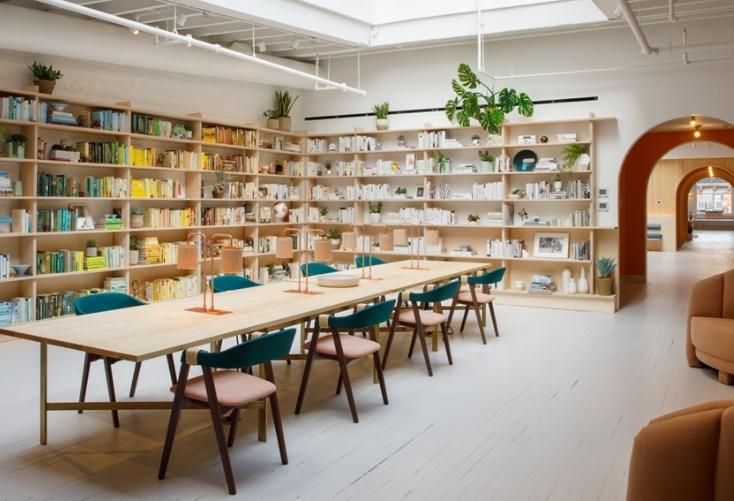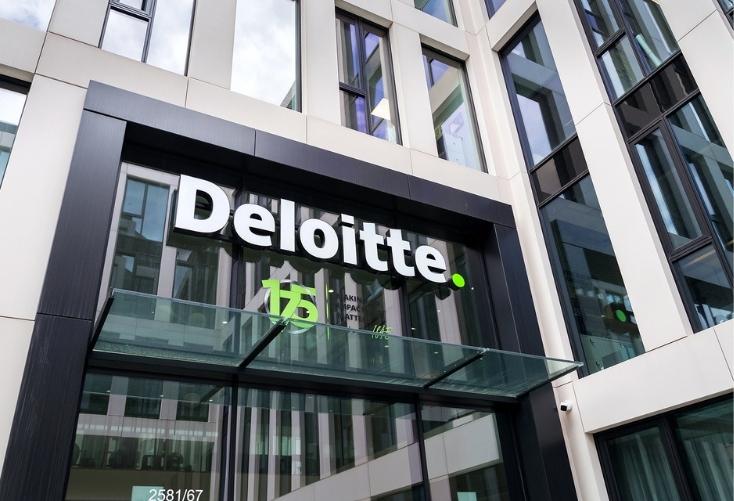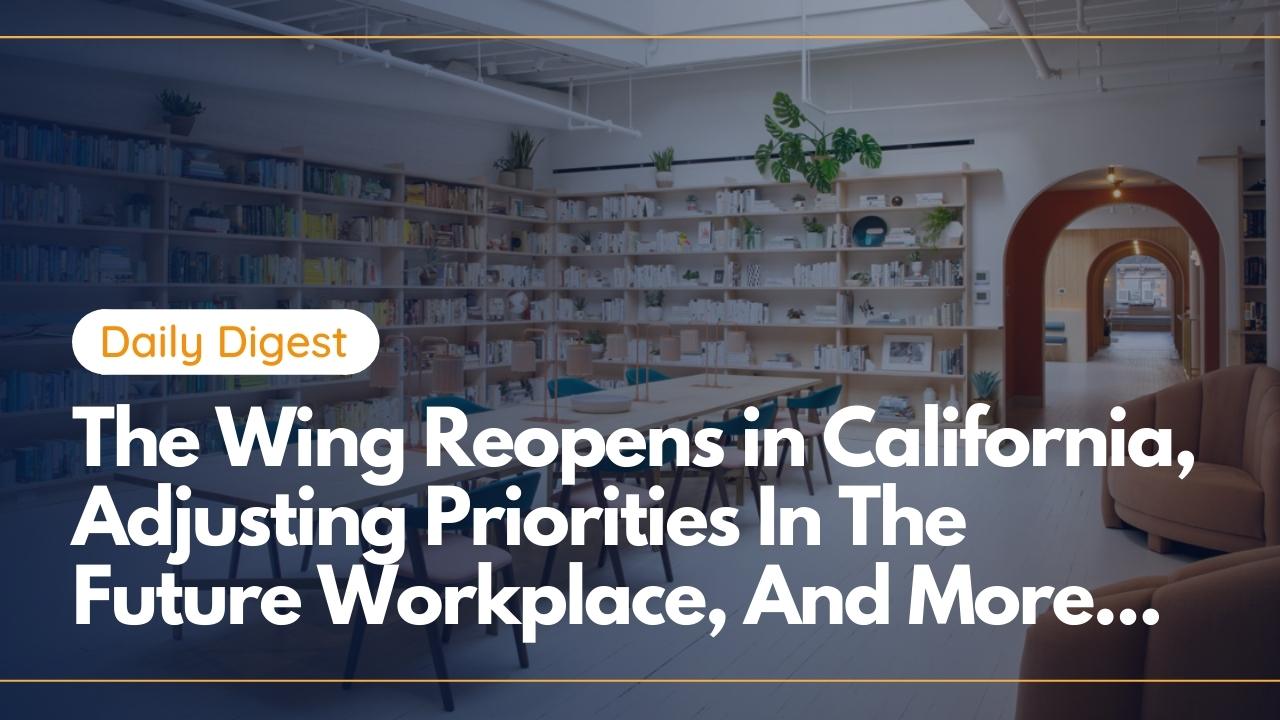Hand selected flexible workspace news from the most reliable sources to keep you ahead of the pack. We find all the latest news, so you don’t have to. Morning and afternoon updates. Stay in the know.
Here’s what you need to know today:
- Flexibility And The Competition For Top Talent
- EQ Building Receives First SmartScore Certification
- The Wing Announces Partnerships As It Reopens Spaces
- Adjusting Priorities In The Future Workplace
- Deloitte Employees Will Choose Their Work Arrangements
- The Competition Between IWG And WeWork Is Heating Up
Flexibility And The Competition For Top Talent
Last March, Amazon announced that the majority of its workers in Seattle would come back into the office in the fall.
Compared to Microsoft’s policy in nearby Redmond that allowed workers to work from home, in the office or a hybrid of the two, this move was not received well by Amazon’s workers.
In the post-pandemic workforce, the competition for top talent has never been more intense. As demand for flexible work arrangements grows, it’s clear that companies, like Amazon, need to put forward more progressive policies if they want to retain their employees.
On the heels of the backlash, Amazon clarified its rules and told workers it would provide them with two days of remote work. However, this still may not be enough.
“People can be wooed away by other companies,” said one Amazon software engineer. “I am jealous of Microsoft. There is implicit trust in Microsoft’s policy, that trust is meaningful.”
When choosing whether to stay with their company, workers have said the employer’s workplace policies played a huge role in their decision, especially if they do not offer many remote work privileges.
For instance, Brescia Young, a senior data scientist at Zillow, said she chose to work for the real estate website because she did not want to relocate from her home and the company offers full flexibility on where their employees can work.

EQ Building Receives First SmartScore Certification
Commercial Estate Group’s EQ Building in Bristol has received WiredScore’s SmartScore smart building certification, making it the first in the world to do so.
When WiredScore launched the rating system this April, 70 buildings across seven countries committed to the certification.
It then revealed the six functions a smart building must feature in order to receive the certification, including individual and collaborative productivity, health and wellbeing, community and services, sustainability, maintenance and optimization and security.
In order to receive the rating, buildings must submit proof that they have met all of these requirements.
The 20,000 square foot EQ Building was able to receive the rating with the help of engineering consultancy Buro Happold. It features around 6,458 square feet of solar panels, 263 bike storage spaces, a bespoke building app, air quality monitoring, real-time energy usage data and more.
“Smart buildings will play a key role in creating more attractive, efficient and sustainable workplaces that allow individual productivity to flourish and where people can meet and collaborate,” said Tom McClellan, country director for UK and Ireland at WiredScore. “As we move closer to a return to workspaces, ensuring tenants are benefiting from the best possible working environments will be paramount to maintaining the dynamism of our cities.”

The Wing Announces Partnerships As It Reopens Spaces
Women-oriented coworking firm The Wing has announced that its Los Angeles location has reopened, and its San Francisco location will open on July 6.
Demand for coworking has risen in recent months, which has led the company to expand its local partnerships.
For instance, the operator has partnered with Jones on Third, Huckleberry and SugarBloom to offer food and pastries in its spaces. This effort aims to boost local businesses across certain communities.
“As a business owner who frequently reaches out to my community of chef friends for help and advice, I love that The Wing provides a space where women entrepreneurs can find their community,” said Sharon Wang, owner and chef at Sugarbloom Bakery. “I always say that food brings people together, and I hope that women of The Wing will bond over Sugarbloom Bakery pastries.”

Adjusting Priorities In The Future Workplace
Companies who are eager to return to pre-pandemic normalcy are stripping their organization of valuable opportunities.
Prior to the pandemic, the future of work focused largely on the implementation of technology and how it would shape operations. While this still rings true, the past year has mainly altered the idea of the workplace altogether.
Instead of simply focusing on how to achieve goals and tasks in a company’s main office, leaders need to shift their priorities onto the wellbeing of employees to truly see meaningful progress. This means changes to workplace arrangements and policies.
For instance, while remote working was once seen as a nice-to-have perk, it’s now a necessity when it comes to valuing the health and safety of employees.
“We’re not going to back to what once was,” said Steve Hatfield, Global Future of Work Leader at Deloitte. “Most organizations have recognized that virtual and distributed work can happen…we will not go back to having everyone in the office in the same way.”
Although the pandemic’s impact on the workplace may still be unclear, one thing that is certain is how it is affecting gender equality, which is another reason to make these adjustments. In fact, the U.S. is now seeing the lowest number of women in the workplace in over three decades.
This indicates that women, and working moms in particular, need more flexibility in their work options if companies want them to remain a vital part of an organization’s operations.

Deloitte Employees Will Choose Their Work Arrangements
Deloitte has announced that once state-based restrictions have been lifted, employees will choose when they return to the office and what hours they will work.
The consultancy firm has done away with specific start and finish times. Even more, there is no set number of days employees will be required to come into the office. Deloitte’s staff will also be given one paid wellbeing day each year
“There will be a greater focus on outcomes, as opposed to inputs,” said Adam Powick, CEO of Deloitte. “So it is less about when and where you work but more about the value and outcomes that you deliver.”
Employees will have the ability to negotiate their work arrangements with their managers. Additionally, workers would need to abide by client procedures when it comes to start and finish times.
However, Tina McCreery, Deloitte’s chief HR officer, doesn’t expect staff to work remotely most of the time.
“For us, in a difficult talent market at the moment with borders closed, this is about reinforcing our culture of trust and empowerment rather than a policy change,” said McCreery.

The Competition Between IWG And WeWork Is Heating Up
This week, CC Capital revealed it has no plans to make a buyout offer for IWG, following the office operator’s warning that it would see slow profit growth this year.
Even more,IWG’s shares have remained around 300p, a steep dip from its pre-pandemic record of 469p that valued the business at £4.7 billion.
If the company ever wants to return to this valuation, it will take a lot of time.
However, the flexible office market has seen an increase in interest in recent months as companies look towards adopting hub-and-spoke models, which IWG is well-suited for.
Yet, the once-disgraced coworking company WeWork has slowly remedied its tarnished reputation and now has plans to go public via merging with a special purpose acquisition company. This would value the New York-based operator at $9 billion, which is nearly twice IWG’s current market capitalization despite being a much larger company.
IWG has over 3,300 business centers worldwide, compared to WeWork’s 851. Additionally, IWG saw $3.4 billion in revenue and $800 million in losses last year, compared to WeWork’s $3.2 billion in revenue and $3.8 million in losses.
However, WeWork is still receiving the backing to be the head honcho in the future of workplace arrangements.
Why? Largely due to the fact that the operator has been using its Millennial-geared brand to adopt franchising agreements and licensees.
Although IWG has also used the asset-light franchise model, its progress with this model has slowed since November 2019.




 Dr. Gleb Tsipursky – The Office Whisperer
Dr. Gleb Tsipursky – The Office Whisperer Nirit Cohen – WorkFutures
Nirit Cohen – WorkFutures Angela Howard – Culture Expert
Angela Howard – Culture Expert Drew Jones – Design & Innovation
Drew Jones – Design & Innovation Jonathan Price – CRE & Flex Expert
Jonathan Price – CRE & Flex Expert













